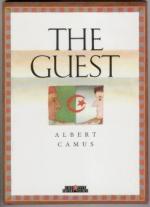|
This section contains 886 words (approx. 3 pages at 300 words per page) |

|
SOURCE: Cervo, Nathan. “Camus's ‘L'Hôte’.” The Explicator 48, no. 3 (spring 1990): 222-24.
In the following essay, Cervo asserts that Camus utilizes elements of Roman Catholic, Marxist, and Gnostic dialectic in “The Guest.”
In Albert Camus's short story “L'hôte” (which is generally translated as “The Guest” in English, although hôte simultaneously means host), the “old gendarme” Balducci (baal, duce: Jehovah) comes from El Ameur (a pun on Semitic el, that is, god, and Latin amor, meaning love) leading a roped, Christlike Arab up the hill to the secular-humanist teacher Daru's “schoolhouse.” The Arab, it turns out, has killed his “cousin” with a “sheephook.” In keeping with Camus's prevailing dialectic, involving Roman Catholicism, Marxism, and Gnosticism, the Arab may be viewed as a kind of Bonus Pastor (Good Shepherd) who has killed a wolf (the “cousin,” Satan qua Christ's “elder brother” in Miltonic and Joycean projections from Gnosticism) threatening...
|
This section contains 886 words (approx. 3 pages at 300 words per page) |

|


